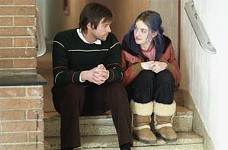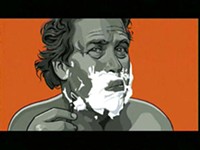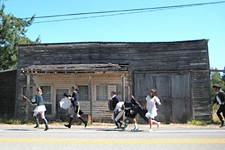'Tarnation' Sensation
Jonathan Caouette's inexplicably perfect documentary of growing up gay in Texas is the astounding new face of DIY moviemaking
By Marc Savlov, Fri., Oct. 22, 2004

Every once in a while – a long, long while – a film arrives that has the ability to change the way the art form is seen, both by viewers and by other artists working within the medium. While the most famous and revered example of this is probably Orson Welles' stunningly bombastic and revolutionary Citizen Kane, these cinematic watershed moments more often come not from the studios, but from the blurry, ill-defined edges of the film form: the underground, the transgressive, the outré, from feverish mavericks who frequently aren't even consciously attempting to do anything more than get their first movie in the proverbial can, much less have it change the face of cinema. Andy Warhol and Paul Morrisey's Factory films, D.A. Pennebaker and the Maysles brothers' documentaries, The Blair Witch Project – all of these came out of left field and ended up as lessons and legends – shot, more often than not, on a wing and a prayer and a whole lot of luck.
Texan Jonathan Caouette's inexplicably perfect first film, the documentary Tarnation, is the most recent example of outsider art colliding with and infecting the mainstream. Shot over the course of very nearly his entire life (from age 11 to his current 32) on a Sony Handycam and Super 8 film, Tarnation was edited with Apple Computer's iMovie software for the ridiculous price of $218 and taken to the 2004 Sundance Film Festival, where it became, virtually overnight, the new face of DIY moviemaking.
Caouette's astounding documentary of growing up gay in Texas and finding his artistic way while caring for his mentally ill mother – a former beauty queen – and battling his own perpetual demons, is nothing short of miraculous. It's also, in its dreamy, stream-of-consciousness way, an epic poem that melds film and music and nontraditional editing techniques with scenes of painfully intimate familial moments and discord to tell the ultimately hopeful story of one family's descent into and out of hell.
For once, saying "It's like nothing you've ever seen before" isn't hyperbole. It's the truth. You honestly haven't. And you aren't likely to again, at least not anytime soon.
The Chronicle spoke to Caouette by phone on the eve of the film's Austin premiere about his movie, his life, and what to do if you're stuck in small-town Texas and want out.
Austin Chronicle: First things first: How's your mom doing?
Jonathan Caouette: Thanks for asking. She's doing very well. I just recently road-tripped her back to Texas from New York and kind of got her reinstated and reacclimated with the Medicare system down there and got her in an apartment and so forth. She's doing really well, actually.
AC: That's good to hear. Your film is the most original documentary I've ever seen, by the way.

JC: Thanks. I had a feeling that Austinites would really get it more than anybody, just because of the whole Texas connection and the whole Texas sensibility.
AC: Just apart from the revelatory nature of the images and the story, the one thing that really stuck with me was the musical tracks you selected, and how they were used to support and enhance the images on screen. You have everyone from Glen Campbell's version of "Wichita Lineman" to the Red House Painters and the Magnetic Fields, which is quite a musical spectrum.
JC: Well, you know, I was talking to this Italian journalist out at the Cannes Film Festival and he asked me, "What would you do if cinema didn't exist?" and I told him, verbatim, I would be busking on Fourth Street, which I think is your new Sixth Street, in Austin, with an acoustic guitar. Everything about this film, I would literally start with the music and then work my way out from that point on. Everything about the film was so organic and kind of told me what it wanted to do. The initial cut, when I first did it, was structured a little bit differently from what it is now. It was a two-and-a-half-hour version that had this sort of fictitious bit slapped on at the very end, which gave me a safety zone so that if I didn't want to give myself away fully by saying, "This is really me, this is really my mother, and these are really the circumstances that we've had to endure," I could get out of it that way. And then right before Sundance I decided that I didn't want to have 99.9% of the movie being truthful and then slap this false ending on it because I thought that would let people down and let myself down as well.
AC: Did you have any trouble getting the music clearances previous to Tarnation's becoming such a cause célèbre?
JC: Oh, my god, yeah. There was a lot of Nick Drake stuff I wanted and some Joni Mitchell, Cat Stevens, just all my favorites. I think Nick Drake's sister got very offended by the film because in the original cut it talked about this guy I had a crush on who looked like Nick Drake, and in captions gave his name, when he was born, and the fact that he committed suicide in 2000. And I think that because there was Nick Drake's music playing underneath these images of this kid, who was sort of emulating Nick Drake, that I upset her or touched a nerve. And I don't blame her. The thing of it is that when I was making this film initially, it was just a cathartic thing that was really very sort of private. I was never really anticipating any sort of distribution, and so I wasn't sensitive to the idea that there could be a possibility of having to go get music clearances. There was a lot of stuff that I wanted that we ended up not being able to get: clips from The Exorcist, the original Stepford Wives, Halloween, Josie and the Pussycats, Wonder Woman, Isis. But that was sort of a life lesson, too, because if you're given a limited amount of resources and time, it really makes you work like you've never worked before. It also allowed us to go back and revisit and rechoreograph certain aspects of the film in a very specific kind of way that we might not otherwise have done.
AC: It's very much a work in progress.
JC: Absolutely. It's still happening. Everything you see in the movie is still there.
AC: It cries out for a sequel somewhere down the line, right?
JC: Oh yeah, and I am going to be working on the sequel. I'm actually moving back to Houston, and I'm going to try to fluctuate between Houston and Austin as much as I can. Austin is so wonderful.

AC: You did all of the editing on Tarnation on Apple's iMovie software – have Steve Jobs and the powers that be at Apple seen the film, and if so, what did they think about it? And did they (hopefully) set you up with some free Apple swag?
JC: No swag. They've seen it and they've championed it and I've been on the cover of their newsletter, but I haven't gotten anything from it. Isn't that fucked up?
AC: Well, you'd think you'd get a new mouse pad or something out of it.
JC: I just don't know if they want to deal with a crazy, disheveled gay boy from Houston. That's probably what it boils down to.
AC: It's the great untapped demographic niche!
JC: Right. But I don't want to say anything bad about Apple because their stuff was so key to making this film. And yet ... I'm still waiting ...
AC: Since this is such a personal film, and since you didn't expect to receive such a tremendous amount of attention, I'm curious as to how its success has affected both your life and that of your mother?
JC: It's psychologically daunting. It still wakes me up in the middle of the night with butterflies in my stomach, wondering what it is that I've done here. Have I unleashed Pandora's Box? I would be a hypocrite and an idiot to say, "Oh, I'm so content and so at peace with everything that's happening." It's a beautiful thing, I think it's ultimately going to be a very nice calling card for me, but it's still tough because I'm still in the thick of it right now. I've literally done about 400 interviews at this point, and so it's really difficult for me to step away and objectify what it is that is happening and what the end result of all this attention will be for me. I mean, so far so good. One good think I can say is that the film does seem to be accessible to more than just a handful of people, and I'm learning that during the screenings and Q&As that I'm doing. Women and men and people of all ages have been coming up to me and just embracing me and beginning these dialogues about their family members and their own experiences with mental illness and so on. It's a crazy, bizarre, and beautiful way to start a conversation with somebody.
AC: As Tarnation documents, you were an outsider – gay, artistic, flamboyant – who grew up in a small Texas town full of intolerance toward people like yourself. You made it out alive, but sometimes, and especially for young people, that doesn't always seem possible when you're stuck in Hellville, USA. What do you say to kids who may be going through some of the same small-town problems that you went through? Any advice?
JC: I don't know, man. "Get the hell out as soon as you can!" I don't know what to say, and I don't want to dis Texas, but for me personally, I had to get out of Texas. Actually, you know what I'd say? "Move to Austin!" Wherever you are – if you're in Dallas, if you're in Houston, wherever – if you don't want to or can't get out of Texas, move to Austin. And I can say this because I grew up in that state. Or build your own commune in West Texas. Sometimes I think Texas has actually gotten a lot better since I've left, it's gotten a lot more liberal, and it's okay to be a freak in the major cities now. And it wasn't when I was there. At all. ![]()
Tarnation opens in theatres Friday, Oct. 22. See Film listings for review.












